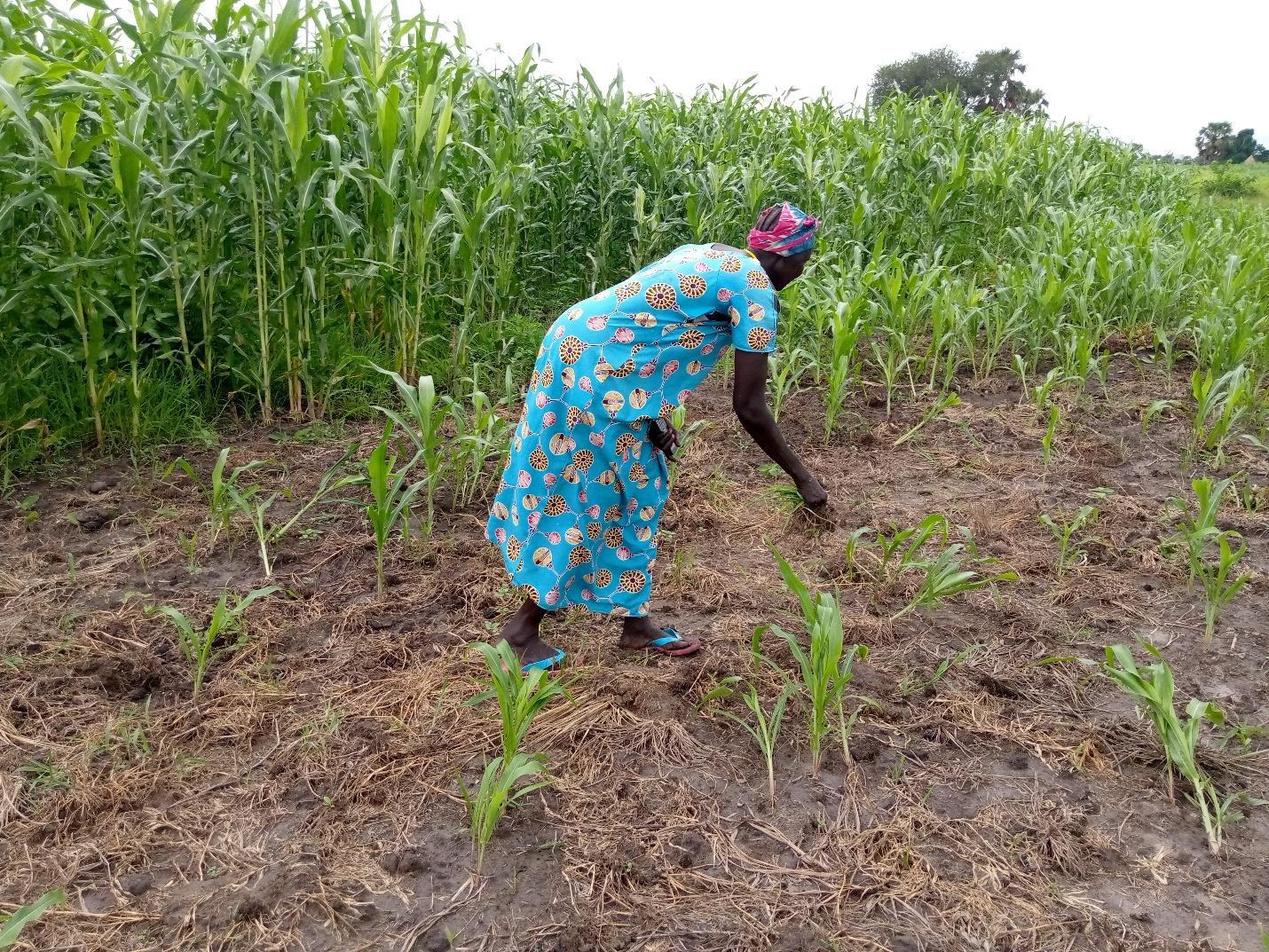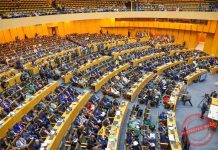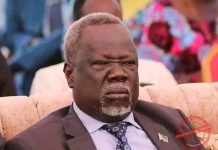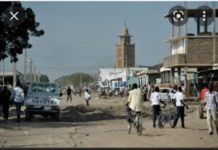Mamer Abraham
Africa-Press – South-Sudan. Regina Adau Dhol is soaked in sweat as she uproots the weeds that are competing for nutrients with her sorghum on a green farm showered by fountains of rain the night before.
Adau, a mother of five, owns two such farms here in Marial-Ajith Boma, Marial-bai Payam, Jur River County, Western Bahr El-Ghazal State. She uses one of her farms to produce seeds for future use, either by her or other farmers; and the other for family consumption.
Before she settled on farming as a source of income, Adau used to make ends meet by selling firewood in Wau town. That was until he joined Piontok (One Heart) Cooperative Society, a group of farmers trained by World Concern and the United Nations Food and Agriculture Organisation (FAO) through the Food and Nutrition Security Resilience Programme (FNS-REPRO) in a project aimed at helping the farmers increase food productivity in South Sudan.
Adau was left a widower over 40 years ago, at the start of the second civil war in Sudan. The demise of her husband, who was the family’s breadwinner, left a family patriarch with no option but to step up and provide for her three sons and two daughters.
“Life was hard before we got trained in modern farming. We had been collecting firewood, and cutting grass. We had been selling these in the market to feed our children,” she recalls with a faint smiley face, perhaps as she reflects on the painful journey she took, the hard life she endured compared to the life of abundance she’s living now.
Before she got the training, Adau says, she would make less than SSP 50,000 from the sale of her vegetables—money that was not enough to take care of her expenses. But now, she claims, her profit margin has more than doubled ten-fold.
“What we had been doing was to store the produce until the time when the cereals would be scarce; then we would take a cow and give the person a bag of sorghum,” she explained.
“Now we have learned. Currently, we sell a bag for SSP 80 000.”
In the last harvest, for example, Adau claimed she cashed in more than SSP 1.3 million from farm produce.
She reinvested the money in other passive income-generating activities to act as a shock on ‘dry days’.
“I used part of that money to send my children to school, to treat the children and myself when sick. I also bought cattle and kept them in case a child marries, we will use the cows to pay the bride price,” she added.
Adera Amien in her groundnuts farm in Kangi Boma, Udichi Payam of Jur River County, Western Bahr El-Ghazal State. Photo: Mamer Abraham.
Adera and her fellow women in Kangi boma had been mixing crops such as sesame, sorghum, and groundnuts during cultivation without separating the seed farms from the ones for family consumption, but after the training offered by World Concern and FAO, through FNS-Repro, she has been registering bumper harvests.
“Now we do not mix various varieties of sorghum. If it is red sorghum, we separate it from the white one. We were given plastic sheets and bags. After making our seeds, in May we got a profit from them,” she explained.
“Some of us are farmers, others have shops; each of us has learned how seeds are produced,” she added.
Unlike Adau, who invested her money in animals, Adera started a small retail shop from her savings from farm produce.
She noted that her life had changed for the better, adding that the knowledge learned from the training has positively impacted her family, which doesn’t need to depend on one source of income for survival.
“Right now, my children are in school. If it were not for this farming, my children would not have gone to school,” she added.
Regina Ayol Madit, a member of Piontok (one heart) Cooperative Society in Marial-Ajith boma or Marial-bai payam, and the chairlady of the CDC Committee, said she was among the women who had been struggling to make a living, but now, her life has improved for the better.
“We have been taught how to save money. I am the one in charge of the money that we save. I solve disputes between people who have issues in the group. If there are people who have refused to give their money, I follow up with them,” the chairperson of a local women’s group said.
The farmers have also been taught how to prepare nursery beds. “Now, we cultivate the seeds on a separate farm and the cereals for consumption on another farm. We have been given machines for testing cereals to see if they are good or bad. If they are groundnuts, we first winnow them so that if they are good seeds, we keep them in the store,” she added.
She hailed UNFAO and World Concern for the training that has liberated them to be able to produce enough for their family’s consumption as well as seeds for sale.
“Initially, we had been suffering. After we were taught by FAO and World Concern, we now have our own things. We make nursery beds so that we can make money out of them. We cultivate cereals for sale so that the children can go to school,” she added.
FNS Repro
The Food and Nutrition Security Resilience Programme is the first four-year Food and Agriculture Organisation (FAO) programme in Eastern Africa that is designed to foster peace and food security at scale.
In Somaliland, the project focuses on animals’ fodder; in Sudan, it focuses on Gum-Arabic production; and in South Sudan, it works on seed production and agriculture.
Seeds were selected to be the value chain for FNS-REPRO in South Sudan after consultations with the Dutch Ministry of Foreign Affairs, the Dutch Embassy in Juba, WUR, and FAO; and confirmed at the end of 2019.
According to Mimi Wanga, the field extension assistant in Western Bahr el Ghazal State, who is the focal person of the project in the state; the project operates in six states of South Sudan, namely: Northern Bahr el Ghazal (Aweil), Eastern Equatoria (Torit and Magwi), Western Bahr el Ghazal (Wau and Jur River Counties), Western Equatoria (Yambio and Zahra), Jonglei (Bor and Akobo) and Upper Nile (Renk).
“Within those two counties (Wau and Jur River Counties), we have the seed producers and the vegetable seed producers. At the beginning of the project, we assisted the beneficiaries with the start-up seeds and also taught them how they could be able to produce seeds,” Mimi explained.
The project is based on a livelihood and resilience-based approach in the regions that are less-stable and solely dependent on humanitarian aid.
In 2019, FNS-REPRO was already in Somaliland, dealing in animal fodder, while in Sudan, the project was on gum-arabic.
According to the data presented by Mimi Emilia Wanga, FNS-REPRO started as a pilot project on October 1, 2020, with baseline surveys to establish the prospects for the project in Wau and Jur River Counties.
In 2021, the FNS-REPRO project reportedly targeted 3 800 beneficiaries with 1 900 farming beneficiaries in Wau County and 1, 900 beneficiaries.
The project has benefited more than 800 people, 400 from Wau County and as similar number from Jur River County.
In 2022, the project targeted a total of 3,400 beneficiaries, 400 whom1,500o benefited in seed fair and1,900d fromseeds distribution in Wau County. In the same year, the total number of beneficiaries in Jur River County was3,400, 0 with1,5000 farmers benefitingfrom them seed fairande 1,900 fromseeds distribution.
Through the project, FAO helped the beneficiaries with the necessary tools, including hoes for digging and weeding; rakes for cleaning, and spades for piling, Mimi added.
The organisation gave 3,000 vouchers (seed fair) to each individual farmer in each county (Wau and Jur-River County) worth SSP 5 000 each to buy seeds from the seed vendors.
In 2023; the project targeted 1,600 beneficiaries with 800 beneficiaries in Wau County and 800 beneficiaries in Jur River County both through Seed fair.
Each voucher in 2023 was valued at SSP 15,000 each after the organization struck an agreement with the vendors to distribute the vouchers to the farmers for them to choose the seeds, they wanted but must not exceed SSP 15,000.
In total, the number of beneficiaries that have benefited from the project since it started are 8,800 farmers, and the total number of vouchers given is 4,600.
The number of vouchers was reduced in 2023 because most of the beneficiaries were able to produce their own seeds independently.
FNS-REPRO project in Western Bahr el Ghazal
2019-2021: Piloting
2021-2022
• Beneficiaries: 3 400
• Vouchers: 3 000
2022-2023
• Beneficiaries: 1 600
• Vouchers: 1 600
Total Beneficiaries since the project started: 8 800
Total number of vouchers given since the project started: 4 600
Source: The City Review South Sudan
For More News And Analysis About South-Sudan Follow Africa-Press






